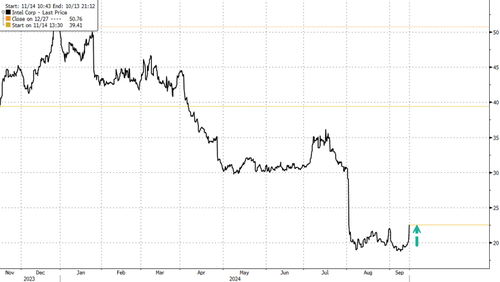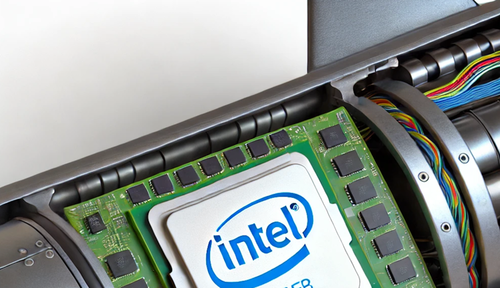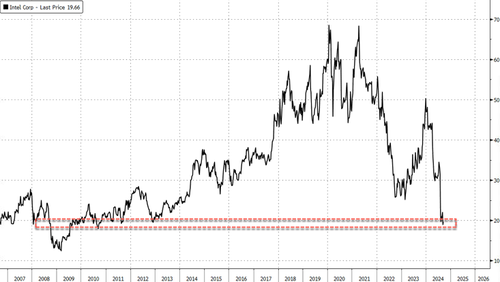Update (1706ET):
Intel shares jumped in after-hours trading in New York following a letter from CEO Pat Gelsinger to employees outlining the chipmaker's next steps in an ambitious turnaround plan.
Key points of Gelsinger's letter include:
-
Intel is focused on strengthening its Foundry business, improving efficiency, and hitting its $10 billion savings target.
-
A new collaboration with Amazon Web Services (AWS) involves co-investment in custom chips, including the production of AI fabric and Xeon chips.
-
Intel received $3 billion in funding under the CHIPS Act to support U.S. semiconductor manufacturing.
-
Intel Foundry will be established as an independent subsidiary, providing more financial flexibility and independence.
-
Intel plans to pause expansion in Poland and Germany but will continue investments in the U.S.
-
Workforce reductions and real estate cuts are ongoing as part of cost-saving measures, with a goal to reduce 15,000 employees by year-end.
Shares of Intel are up more than 6% in the after-hours, near the $21 handle. Year-to-date, shares are down a little more than 58%.
Intel landing the deal with Amazon's AWS for custom chip designs is likely the main driver in after-hour gains.
Here's more on that deal:
Amazon Web Services selects Intel Foundry
Today, we announced that we will expand our strategic collaboration with Amazon Web Services (AWS). This includes a co-investment in custom chip designs, and we have announced a multi-year, multi-billion-dollar framework covering Intel products and wafers.
Specifically, Intel Foundry will produce an AI fabric chip for AWS on Intel 18A. We will also produce a custom Xeon 6 chip on Intel 3 that builds on our existing partnership, under which Intel produces Xeon Scalable processors for AWS. More broadly, we expect to have deep engagement with AWS on additional designs spanning Intel 18A, Intel 18AP and Intel 14A.
This framework reflects the power of our "better together" strategy, anchored on our integrated portfolio across foundry services, infrastructure and x86 products. And with the 5N4Y finish line in sight, we are beginning to see a meaningful uptick in interest from foundry customers. This includes continued momentum in advanced packaging, which remains a meaningful differentiator for Intel Foundry as we have tripled our deal pipeline since the beginning of the year.
Full letter from the CEO:
Come on, Gelsinger—your job depends on the stock going up from here.
* * *
Shares of American chipmaker Intel are marginally higher in premarket trading following a Friday evening Bloomberg report indicating the company could secure up to $3.5 billion in federal grants to manufacture chips for US military and intelligence applications.
The report was based on sources familiar with the chipmaker's binding agreement with US officials. They said the secretive Pentagon program, 'Secure Enclave,' that awarded Intel $3.5 billion, is a move by the military to produce chips domestically, more especially in several states, including a facility in Arizona.
Here's more from Bloomberg:
The funding could be announced as soon as next week, said the people, who asked not to be identified because the discussions are private. It would add to a possible $8.5 billion in grants and $11 billion in loans that Intel was awarded in March under the Chips and Science Act, a law that President Joe Biden signed in 2022 to revitalize US semiconductor manufacturing and reduce reliance on Asia.
Intel is still negotiating the terms of that broader incentive package, which is intended to support facilities in Arizona, Ohio, New Mexico and Oregon. Like other Chips Act winners, Intel hasn't received any money yet, and its award is considered preliminary. The funding for Secure Enclave also comes from the Chips Act grant program administered by the Commerce Department — following a dispute earlier this year over which agency would be responsible — but was handled outside of the standard application process.
The agreement on Secure Enclave comes amid the dumpster fire at Intel under the direction of CEO Pat Gelsinger, who is doing his best to replace Marissa Mayer as the most overpaid and useless 'turnaround' CEO in tech history.
Last month, the struggling chipmaker reported a devastating earnings report and revenue forecast that sent shares plunging. On the year, Intel has tumbled nearly 61% (as of Friday's close). Shares are up around 2% in premarket trading in New York.
Intel's turnaround plan includes cost-cutting measures like selling businesses, such as the programmable chip unit Altera, which Intel can no longer support due to its dwindling profits, according to a source from Reuters.
Update (1706ET):
Intel shares jumped in after-hours trading in New York following a letter from CEO Pat Gelsinger to employees outlining the chipmaker's next steps in an ambitious turnaround plan.
Key points of Gelsinger's letter include:
-
Intel is focused on strengthening its Foundry business, improving efficiency, and hitting its $10 billion savings target.
-
A new collaboration with Amazon Web Services (AWS) involves co-investment in custom chips, including the production of AI fabric and Xeon chips.
-
Intel received $3 billion in funding under the CHIPS Act to support U.S. semiconductor manufacturing.
-
Intel Foundry will be established as an independent subsidiary, providing more financial flexibility and independence.
-
Intel plans to pause expansion in Poland and Germany but will continue investments in the U.S.
-
Workforce reductions and real estate cuts are ongoing as part of cost-saving measures, with a goal to reduce 15,000 employees by year-end.
Shares of Intel are up more than 6% in the after-hours, near the $21 handle. Year-to-date, shares are down a little more than 58%.
Intel landing the deal with Amazon's AWS for custom chip designs is likely the main driver in after-hour gains.
Here's more on that deal:
Amazon Web Services selects Intel Foundry
Today, we announced that we will expand our strategic collaboration with Amazon Web Services (AWS). This includes a co-investment in custom chip designs, and we have announced a multi-year, multi-billion-dollar framework covering Intel products and wafers.
Specifically, Intel Foundry will produce an AI fabric chip for AWS on Intel 18A. We will also produce a custom Xeon 6 chip on Intel 3 that builds on our existing partnership, under which Intel produces Xeon Scalable processors for AWS. More broadly, we expect to have deep engagement with AWS on additional designs spanning Intel 18A, Intel 18AP and Intel 14A.
This framework reflects the power of our "better together" strategy, anchored on our integrated portfolio across foundry services, infrastructure and x86 products. And with the 5N4Y finish line in sight, we are beginning to see a meaningful uptick in interest from foundry customers. This includes continued momentum in advanced packaging, which remains a meaningful differentiator for Intel Foundry as we have tripled our deal pipeline since the beginning of the year.
Full letter from the CEO:
Come on, Gelsinger—your job depends on the stock going up from here.
* * *
Shares of American chipmaker Intel are marginally higher in premarket trading following a Friday evening Bloomberg report indicating the company could secure up to $3.5 billion in federal grants to manufacture chips for US military and intelligence applications.
The report was based on sources familiar with the chipmaker's binding agreement with US officials. They said the secretive Pentagon program, 'Secure Enclave,' that awarded Intel $3.5 billion, is a move by the military to produce chips domestically, more especially in several states, including a facility in Arizona.
Here's more from Bloomberg:
The funding could be announced as soon as next week, said the people, who asked not to be identified because the discussions are private. It would add to a possible $8.5 billion in grants and $11 billion in loans that Intel was awarded in March under the Chips and Science Act, a law that President Joe Biden signed in 2022 to revitalize US semiconductor manufacturing and reduce reliance on Asia.
Intel is still negotiating the terms of that broader incentive package, which is intended to support facilities in Arizona, Ohio, New Mexico and Oregon. Like other Chips Act winners, Intel hasn't received any money yet, and its award is considered preliminary. The funding for Secure Enclave also comes from the Chips Act grant program administered by the Commerce Department — following a dispute earlier this year over which agency would be responsible — but was handled outside of the standard application process.
The agreement on Secure Enclave comes amid the dumpster fire at Intel under the direction of CEO Pat Gelsinger, who is doing his best to replace Marissa Mayer as the most overpaid and useless 'turnaround' CEO in tech history.
Last month, the struggling chipmaker reported a devastating earnings report and revenue forecast that sent shares plunging. On the year, Intel has tumbled nearly 61% (as of Friday's close). Shares are up around 2% in premarket trading in New York.
Intel's turnaround plan includes cost-cutting measures like selling businesses, such as the programmable chip unit Altera, which Intel can no longer support due to its dwindling profits, according to a source from Reuters.



